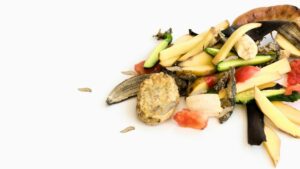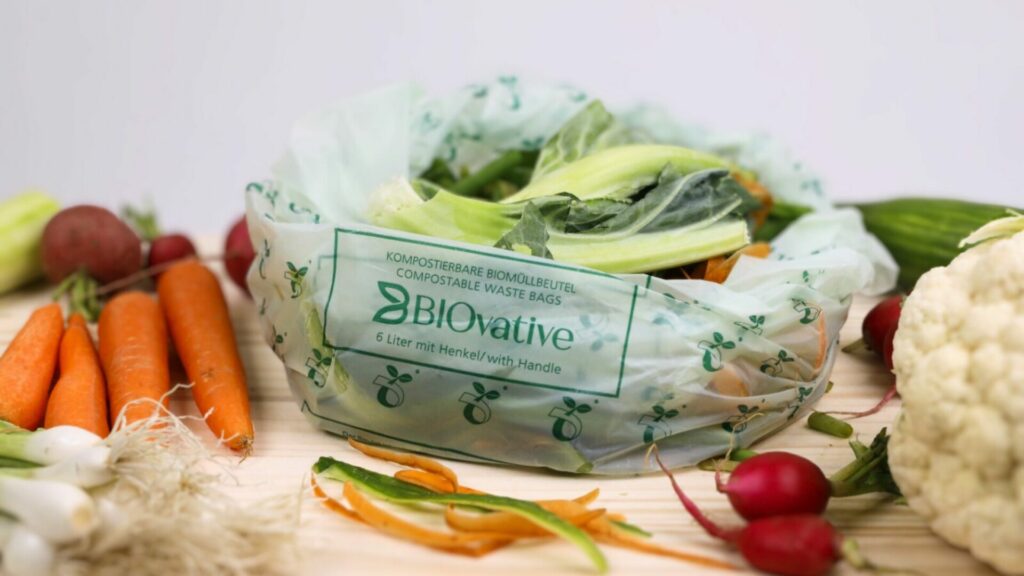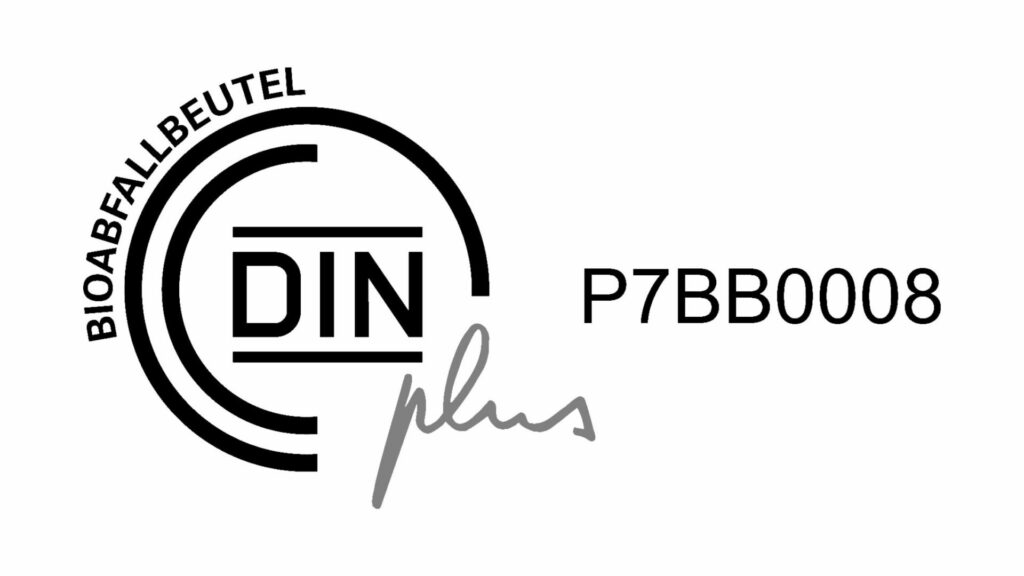Startseite » BIOvative Magazine » Maden in der Biotonne
DINplus organic waste bag certification – for a clean garbage can
DINplus organic waste bag certification – for a clean garbage can
- 07/09/2023
- Autor: Janine Friebel
- Reading Time: 9 Minutes
Organic waste bags with this DINplus “organic waste bag” certificate not only keep your organic waste garbage can clean. These waste bags made of bioplastics can also be completely composted in composting plants within six weeks. This means that with the latest amendment to the biowaste ordinance, there is almost nothing standing in the way of their use in your domestic organic waste garbage can.
Overview of DINplus organic waste certification
Core statement of the DINplus organic waste bag certification
The “DIN plus organic waste bags” certification system was developed by DIN CERTCO and limits the time given to compostable organic waste bags to rot to a maximum of six weeks. This is only half the time allowed by the European standard DIN EN 13432.
The DINplus organic waste bag certification has the following advantages for you
The certificate
- is used as a quality criterion for organic waste bags.
- certifies that the organic waste bag is biodegradable as well as compostable.
- also qualifies organic waste bags for use in the domestic organic waste garbage can because the maximum rotting time corresponds to a maximum of six weeks.
Requirements for DINplus organic waste bag certification
- the organic waste bag undergoes chemical characterization, especially testing for heavy metals and toxic substances.
- a test for complete biodegradability is made.
- disintegration under industrial composting conditions after a maximum of six weeks is verified.
- in addition, a determination of the compost quality is carried out. This includes, in particular, an ecotoxicity test on two plant species.
- in addition, testing under an infrared spectrum follows.
- if applicable, earthworm toxicity is also tested when the AS 4736 standard applies.
Differentiation from other certificates
Certification bodies
- DIN CERTCO (TÜV Rheinland)
Certificate
Examples of products with DINplus organic waste bag certification
The DINplus organic waste bag certification in detail
The DINplus organic waste bag certification was commissioned by Verbund kompostierbarer Produkte e.V.. The seal was developed by DIN CERTCO, part of TÜV Rheinland. The purpose of the certificate is to indicate that organic waste bags with this certification can also be decomposed in composting plants by waste recyclers and can be used accordingly for waste disposal in the organic waste garbage can. For this reason, the DINplus “organic waste bag” certificate also applies only to organic waste bags and not to other biodegradable containers, such as food packaging.
What exactly it means when products are biodegradable, we have summarized for you in our article “Biodegradable, compostable, biobased, recyclable – meaning and difference”.
Compostability in the sense of the DINplus "organic waste bag" certificate
Organic waste bags are considered compostable within the meaning of the DINplus “organic waste bag” certification if they are decomposed in an industrial composting plant at temperatures of at least 60 to 65 degrees within six weeks. In the process, a maximum of 10 percent of the original biomass may remain after screening through a sieve with a 2-millimeter opening.
The DINplus “organic waste bag” certification serves as a supplement to the DIN 13432 and DIN 14995 standards and is only awarded if the maximum rotting time of the organic waste bag is no more than six weeks and the other test requirements that also apply to the “Keimling” are met.
This means that the test requirements for the “Keimling” and the DINplus “organic waste bag” certification are congruent, except for the rotting times. While products with the Keimling must be compostable within 12 weeks, the maximum rotting time of the DINplus certification is halved to six weeks. You can find out more about the testing requirements for the seedling in our article: “This is what the “Keimling” is all about: DIN standard EN 13432″.
Test specifications behind the DINplus organic waste bag certification
The basis for the certification are the requirements from DIN 13432, which are also necessary for the award of the Keimling. Only in the rotting time does the DINplus “organic waste bag” certification go beyond the requirements of the Keimling: the maximum rotting time of the organic waste bag is halved from 12 to a maximum of six weeks.
Analogous to the Keimling, after a maximum of six weeks of composting, no more than 10 percent of the original biomass may remain when the compost is screened through a sieve with a 2-millimeter opening.
In addition, complete biodegradability must be ensured within six months. This means the product must decompose to carbon dioxide, water and a maximum of 10 percent of its biomass within six months.
With regard to pollutants and possible toxicity tests, compliance with the limit values specified in DIN 13432 applies.
Other standards that can be used for testing are:
- DIN EN 14995: “Kunststoffe - Bewertung der Kompostierbarkeit. Prüfschema und Spezifikationen"
- ISO 17088 “Festlegung für kompostierbare Kunststoffe"
- ISO 18606 “Packaging and environment - organic recycling”
- AS 4736 “Biodegradable Plastics - Biodegradable Plastics suitable for Composting and other microbial Treatment”
Practical implementation of the DINplus organic waste bag certification in waste disposal
In February 2022, the German Federal Council passed an amendment to the Biowaste Ordinance that contains an important change for you: Effective November 1, 2023, waste bags made of organic waste bags that have been tested and labeled in accordance with the DINplus organic waste bag certification will no longer be considered foreign material in the organic waste garbage can. This means you may use these organic waste bags to line the organic waste garbage can and as organic waste bags in the organic waste garbage can. There are some requirements for this, which are laid down in the amendment.
- The most important prerequisite: the local waste disposal company has permitted the use of these organic waste bags in its area of responsibility in accordance with the Organic Waste Ordinance.
- In addition, the organic waste bag must meet the requirements of DINplus organic waste bag certification.
- In addition, the waste bag must have been manufactured from mainly renewable raw materials.
- Last but not least, the bag must have been clearly marked by the manufacturer with the green “Keimling” and the indication of the permissibility of use.
The prerequisite that you must clarify: Check the waste disposal statutes of the local public waste disposal authority! If the use of corresponding organic waste bags is permitted there, you can use them for the organic waste garbage can without any problems.
In practice, the disposal of organic waste bags with DINplus certification is unfortunately not so simple. In discussions with many disposal companies, it becomes clear: many disposal companies do not seem to be familiar with the distinction between bioplastics and plastics.
And this is currently our mission as BIOvative: We are doing educational work on the subject of bioplastics and organic waste. Here we are in discussion with various composting plants, but also disposal companies. In this way we want to achieve that the amendment of the biowaste ordinance is also implemented in your district.
So check carefully whether you are allowed to dispose of the organic waste bags via the domestic organic waste garbage can. They are always suitable for the clean collection of your waste in the kitchen and garden and you avoid unnecessary additional plastic waste!
Collect biowaste cleanly and with a clear conscience with DINplus certification
An example of an everyday product with DINplus “organic waste bag” certification are the compostable organic bags from BIOvative. They are made from renewable, European raw materials and produced in Germany. This makes them not only regional, but also fully compostable and biodegradable.
In addition to the DINplus “organic waste bag” certification, they also carry the OK Compost HOME seal and the “Keimling”.
Always stay up to date: To make sure you don’t miss any news from BIOvative, sign up for our newsletter and follow us on social media!

Janine Friebel

Janine Friebel
These articles might also interest you

Ocean Plastic: Greenwashing oder Lösung gegen die Plastikflut?
Content We are suffocating in plastic waste What is “Ocean Plastic” and how does it contribute to solving the crisis? How can plastic be recycled?

Klimaschutzklage: Wie gut stehen Deine Chancen, erfolgreich eine lebenswerte Zukunft einzuklagen?
Content The most important facts about the climate protection lawsuit Your right to climate protection The legal basis for the climate protection lawsuit Liveable future

Maggots in the organic waste garbage can: what to do?
Contents This helps against maggots in the organic waste garbage can The right location for the organic waste garbage can Avoid humidity Keep garbage cans




